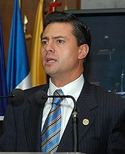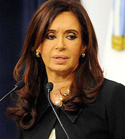redo Jump to...
print Print...
MEXICO – New government to reconsider collaborative policies with U.S. amid new state marijuana laws
A top aide to Mexico’s President-elect Enrique Pena Nieto says votes to legalize the recreational use of marijuana in Colorado and Washington state will force the Mexican government to rethink its efforts at trying to halt marijuana smuggling across the Southwest border.
Luis Videgaray, former general coordinator of Mr. Pena Nieto’s successful 2012 campaign who now heads the incoming president’s transition team [said] the new administration has consistently opposed the legalization of drugs, but the Colorado and Washington state votes are in conflict with his government’s longstanding and costly efforts to eradicate the cultivation and smuggling of marijuana.
“These important modifications change somewhat the rules of the game in the relationship with the United States,” Mr. Videgaray said. “I think we have to carry out a review of our [collaborative] policies in regard to drug trafficking and security in general.
“Obviously we can’t handle a product that is illegal in Mexico, trying to stop its transfer to the United States, when in the United States, at least in part of the United States, it now has a different status,” he said.
More than 47,000 people have been killed in drug-related violence in Mexico since President Felipe Calderón began a military assault on violent drug cartels in that country in 2006.
During his presidential campaign, Mr. Pena Nieto vowed to continue that country’s fight against drug trafficking. The topic of legalized marijuana is sure to come up during Mr. Pena Nieto’s planned Nov. 27 trip to the United States, when he will visit the White House. …
Mr. Videgaray is expected to play a significant role in the Pena Nieto administration. In September, the newly-elected president, who will assume office on Dec. 1, said Mr. Videgaray would head the team that will set policy direction for the new government.
BULGARIA – Europe’s oldest prehistoric town unearthed
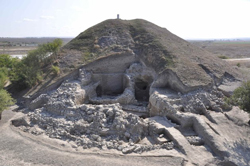
Archaeologists in Bulgaria say they have uncovered the oldest prehistoric town found to date in Europe.
The walled fortified settlement, near the modern town of Provadia, is thought to have been an important center for salt production.
Its discovery in north-east Bulgaria may explain the huge gold hoard found nearby 40 years ago.
Archaeologists believe that the town was home to some 350 people and dates back to between 4700 and 4200 BC. That is about 1,500 years before the start of ancient Greek civilization.
The residents boiled water from a local spring and used it to create salt bricks, which were traded and used to preserve meat. Salt was a hugely valuable commodity at the time, which experts say could help to explain the huge defensive stone walls which ringed the town.
Excavations at the site, beginning in 2005, have also uncovered the remains of two-story houses, a series of pits used for rituals, as well as parts of a gate and bastion structures.
A small necropolis, or burial ground, was discovered at the site earlier this year and is still being studied by archaeologists.
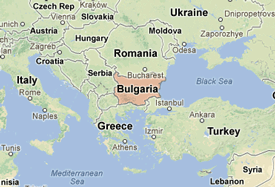
“We are not talking about a town like the Greek city-states, ancient Rome or medieval settlements, but about what archaeologists agree constituted a town in [5000] BC,” Vasil Nikolov, a researcher with Bulgaria’s National Institute of Archaeology, told the AFP news agency.
Archaeologist Krum Bachvarov from the institute said the latest find was “extremely interesting.” He said: “The huge walls around the settlement, which were built very tall and with stone blocks… are also something unseen in excavations of prehistoric sites in south-east Europe so far.”
Similar salt mines near Tuzla in Bosnia and Turda in Romania help prove the existence of a series of civilizations which also mined copper and gold in the Carpathian and Balkan mountains during the same period.
BBC Europe correspondent Nick Thorpe says this latest discovery almost certainly explains the treasure found exactly 40 years ago at a cemetery on the outskirts of Varna, 21 miles away, the oldest hoard of gold objects found anywhere in the world.
ARGENTINA – Argentinians flood the streets to protest against President Cristina Fernandez
Brandishing banners and banging on pots and pans, thousands of Argentinians take to streets of Buenos Aires to protest against President Cristina Fernandez.
An estimated 700,000 people gathered around the city’s landmark obelisk and other main avenues to march towards the Casa Rosada, the Argentine seat of government.
High crime, inflation of roughly 25 per cent a year, and a possible bid by government allies to reform the constitution to allow Ms Fernandez to run for a third term are also stoking unrest, particularly among middle-class Argentinians. Her government has virtually banned dollar purchases and it limited imports this year, worsening a steep economic slowdown.
Protesters in neighborhoods throughout Buenos Aires waved signs demanding freedom, transparency and an end to crime and corruption.
The event, known in Argentina as 8N, for the 8th of November, was planned months in advance and was heavily advertised in social media networks.
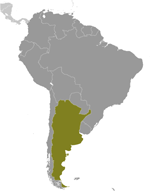
The center-left leader won easy re-election a year ago but her approval ratings have slid since. A recent poll…puts her approval rating at 31.6 per cent in October, up 1 percentage point from a month earlier, while her rejection rating dipped slightly to 59.3 per cent.
Fernandez’s government spends heavily to stoke high economic growth and backs big wage hikes that tend to mirror inflation.
Supporters claim protesters merely represent middle and upper class frustrations with the left-leaning government and not the population at large.
(The news briefs above are from wire reports and staff reports posted at WashingtonTimes.com on Nov. 8, BBC News on Oct. 31 and London’s Daily Telegraph on Nov. 9.)
Questions
1. For each of the 3 countries, give the following information:
a) location/the countries that share its borders
b) the religious breakdown of the population
c) the type of government
d) the chief of state (and head of government if different) [If monarch or dictator, since what date has he/she ruled? – include name of heir apparent for monarch]e) the population
2. For MEXICO:
a) list the who, what, where and when of the news item
b) President-elect Nieto’s spokesman Luis Videgaray confirmed that in all markets supply and demand are inseparable and they have to be faced with a mindset of shared responsibility and with clear objectives. How do you think President Obama should respond to President-elect Nieto’s suggestion that Mexico might end its fight against drug-smuggling based on the Colorado and Washington state laws? Explain your answer.
c) In 2010, when California attempted to pass a similar law, Attorney General Eric Holder issued a warning letter saying the Justice Department would “vigorously enforce” federal drug laws if the state initiative passed. Should the Justice Department do the same in Colorado and Washington? Explain your answer.
3. For BULGARIA:
a) list the who, what, where and when of the news item
b) Define pre-historic.
4. For ARGENTINA:
a) list the who, what, where and when of the news item
b) What percent of the population participated in the protest against President Kirchner?
c) Supporters claim protesters merely represent middle and upper class frustrations with the left-leaning government and not the population at large. Do you think this is true? Explain your answer.
Background
MEXICO:
- The Obama administration has been silent on the issue of legalized recreational marijuana, although it vigorously and publicly opposed a similar measure in 2010 in California, which was defeated.
- At that time, Attorney General Eric H. Holder issued a warning letter saying the Justice Department would “vigorously enforce” federal drug laws if the state initiative passed.
- Mr. Holder did not publicly comment on this year’s efforts to legalize marijuana in Colorado and Washington state.
- Asked about the Colorado and Washington state votes, Justice Department spokeswoman Nanda Chitre said only: “The department’s enforcement of the Controlled Substances Act remains unchanged. In enacting the Controlled Substances Act, Congress determined that marijuana is a Schedule I controlled substance. We are reviewing the ballot initiatives and have no additional comment at this time.”
- The White House has had no comment on Mr. Videgaray’s remarks.
- The new laws allow those 21 and older in Washington state to purchase an ounce of marijuana from a licensed retailer and in Colorado to possess an ounce of the drug and grow as many as six plants in private.
- The Colorado law is scheduled to go into effect in June. The Washington law starts in December 2013.
- Despite the lack of comments, current federal law – the Controlled Substances Act – lists marijuana as a Schedule 1 drug, meaning it has a high potential for abuse and has no accepted medical use. Other Schedule 1 drugs include heroin, LSD and Ecstasy. (from the Washington Times article)
ARGENTINA:
- In addition to the 700,000 at the protest in Buenos Aires, other demonstrations were held on plazas across Argentina, including in major cities such as Cordoba, Mendoza and La Plata, while protesters massed outside Argentine embassies and consulates from Chile to Australia.
- In Rome, about 50 protesters, all Argentine expats, held a noisy protest outside the consulate on Via Veneto, one of the city’s landmark streets. Among the slogans being shouted was “Cristina, go away.”
- About 200 demonstrators braved rain in Madrid to bang pots outside the Argentine consulate.
- “In Argentina, there’s no separation of power and it cannot be considered a democracy,” said Marcelo Gimenez, a 40-year-old from Buenos Aires who has been living in Spain for two years. “Cristina is not respecting the constitution. The presidency is not a blank check and she must govern for those who are for her and against her.” (from a Washington Post article)
Daily “Answers” emails are provided for Daily News Articles, Tuesday’s World Events and Friday’s News Quiz.
